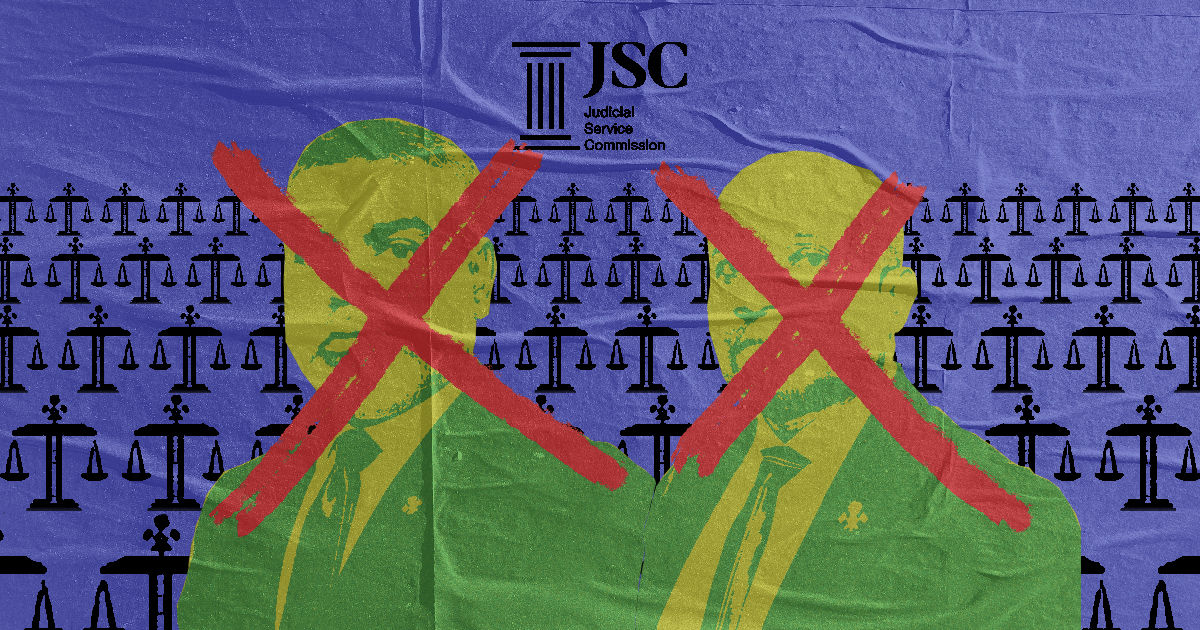Maldives judicial purge continues despite global outcry
Ethics probes target judges who opposed Supreme Court dismissals.

Artwork: Dosain
25 May 2025, 16:25
Undeterred by international censure over the removal of two Supreme Court justices, the Maldives government is intent on culling independent judges from the judiciary, opposition and civil society warn.
Two judges on the Judicial Service Commission who opposed the Supreme Court dismissals found themselves under investigation last week. The 10-member watchdog opened ethics probes against Civil Court Judge Faruhad Rasheed and High Court Judge Mohamed Niyaz – the JSC’s only dissenting voices – after they voted against removing justices Azmiralda Zahir and Mahaz Ali Zahir.
“This is just part of a much larger, comprehensive plan to intimidate each and every member of the judiciary,” MP Meekail Naseem from the opposition Maldivian Democratic Party told the Maldives Independent.
The ruling party supermajority impeached the Supreme Court justices despite a chorus of concern from international rights organisations, the UN human rights system and the bar councils of neighbouring countries, all of which sounded the alarm over the JSC’s alleged political influence and lack of due process.
Six of the JSC’s members are the president’s appointees and ruling party lawmakers. Their apparent strategic timing in suspending the justices prevented the Supreme Court from blocking a constitutional floor-crossing prohibition. The move came minutes before the court could hear arguments for a stay order on the anti-defection provisions.
“There won’t be any influence that this government would exert, or has exerted, over the judiciary. We want matters to proceed through a fair system,” President Dr Mohamed Muizzu insisted on Sunday after ratifying sweeping changes to the gang crimes law, doubling down on his previous denial of controlling the judicial watchdog.
Clearing house
Judges Faruhad and Niyaz’s cases are before a subcommittee that reviews complaints to determine if an investigation is warranted, a senior JSC official told the Maldives Independent. There are two complaints against Niyaz and one against Faruhad.
“These complaints are not new. In all three instances, after previously reviewing the complaints, JSC had decided not to pursue them further as there wasn’t any merit to the complaints. Now the JSC has taken initiative to investigate them,” the JSC official said.
The commission is due to decide on proceeding with formal investigations after the subcommittee presents the revived cases.
A JSC spokesperson was unavailable for comment.
The subcommittee process is part of the legal procedure for investigating alleged misconduct or breaches of ethical standards. But in late February, the JSC skipped the process before placing justices Azmiralda and Mahaz under investigation, an oversight highlighted by parliament’s counsel general when she questioned the legality of the impeachment proceedings.
The extraordinary meeting where the suspensions were hastily approved took place in the absence of the two judges on the JSC.
“Immediately after the dismissal of the Supreme Court justices, the JSC looking to initiate investigations of misconduct against the two judges that had voted against the recommendation for dismissal is concerning,” Azza Mohamed, governance manager of Transparency International’s local chapter, told the Maldives Independent.
“In combination, all of these actions paint a picture of undue influence, intimidation, suppression and the removal of independent voices in the JSC. It also creates a chilling effect and sends a threatening message to other members of the JSC and acts as a hindrance to attract qualified, independent persons with integrity to fill JSC roles.”
The dismissal of the Supreme Court justices “raises serious concerns about respect for the independence of the judiciary,” the UN Office of the High Commissioner for Human Rights said last week.
“The disciplinary proceedings brought against three of the Supreme Court’s Justices appear to violate the principle that judges can only be dismissed on serious grounds of misconduct or incompetence and in accordance with fair procedures guaranteeing objectivity and impartiality as provided for by the Constitution or the law,” Margaret Satterthwaite, the UN Special Rapporteur on the Independence of Judges and Lawyers., observed earlier.
“The pressure of suspensions, disciplinary proceedings and investigations may amount to an interference in the independence of this institution,” she said.
The justice’s dismissals “greatly threatens judicial independence and the separation of powers in the Maldives and sets a dangerous precedent in a country where democracy and the rule of law remain at risk,” the International Federation for Human Right warned last week.
Discussion
No comments yet. Be the first to share your thoughts!
No comments yet. Be the first to join the conversation!
Join the Conversation
Sign in to share your thoughts under an alias and take part in the discussion. Independent journalism thrives on open, respectful debate — your voice matters.




